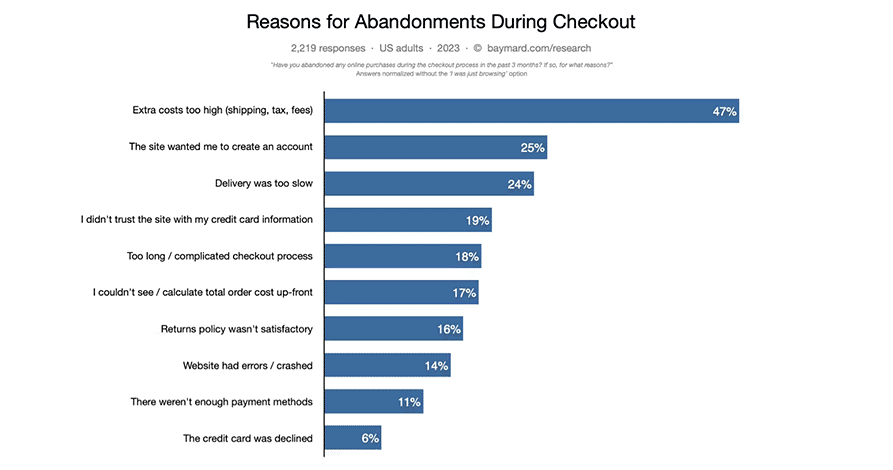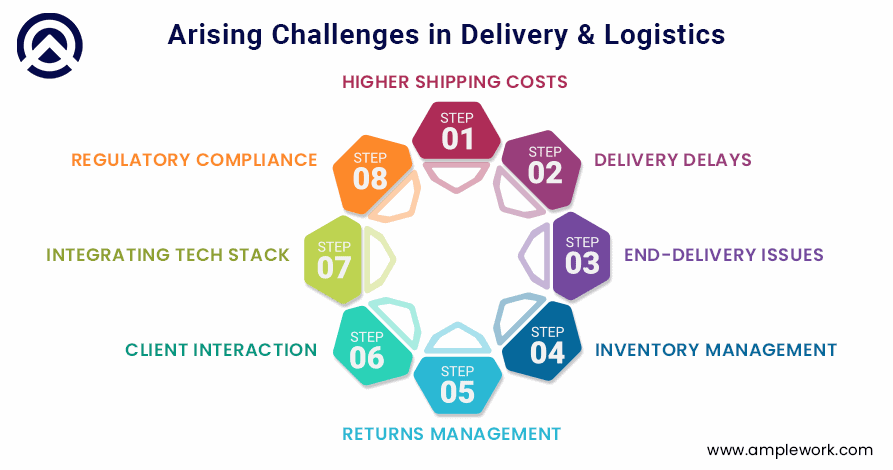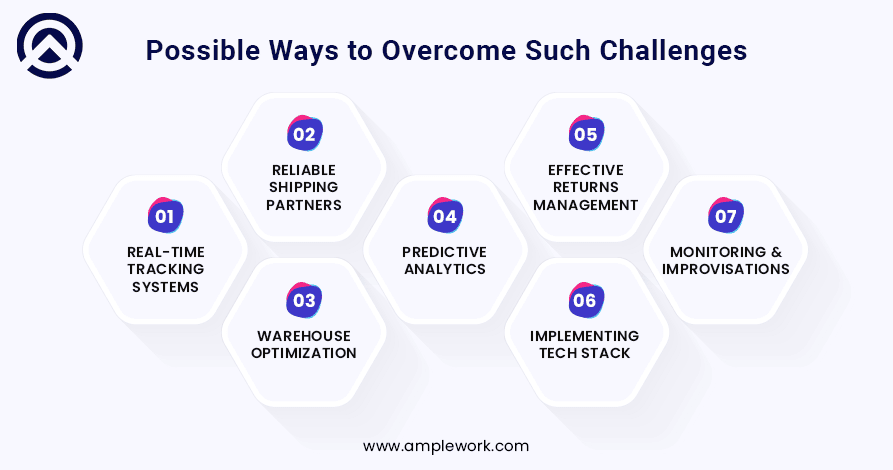Delivery and Logistics Challenges in E-Commerce: Solutions for Efficiency
E-commerce app development services are completely dependent on multiple pillars that are named the delivery and logistics. Both these pillars play an important role in maintaining and managing client satisfaction for both the businesses and their targeted audiences. We all are aware of the fact that the E-commerce industry is witnessing rapid growth outcomes within the past few years. Since, with its rapid growth, the popularity of supply chain management and omni-channel retailing is also growing daily. With this growth, a wide range of challenges are occurring in terms of delivery and logistics. These challenges bring various negative outbreaks for the E-commerce businesses by reducing the client’s trust.
The evolution of digital solutions has revolutionized and streamlined e-commerce operations. Tackling the logistics challenges in e-commerce demands the adoption of various strategies and procedural changes. These strategic improvements provide users with a multitude of advantages, contributing to increased success rates for online shopping businesses. They possess the capability to expand your business’s reach globally, enhancing the overall shopping experience for users while mitigating logistical and delivery-related hurdles. These issues can be resolved through the implementation of an efficient and reliable shipping process, resulting in increased client satisfaction rates.
With this blog, we are highlighting the actual challenges that are faced by E-commerce businesses when it comes to logistics and product delivery. Also, we are focusing on some of the highly preferred strategies by the top E-commerce giants to address the common delivery and logistics-related issues. With the help of strategies like offering solutions for efficient order processing, delivery optimization, and providing the clients with a seamless shopping experience, enhancing the business growth and building the client’s trust.
A Few Statistical Outcomes
There are a lot of reasons why the shopping carts are abandoned by the users. These reasons are identified by an E-commerce institute that is “Baymard” According to their research outcome. It has been finalized that approximately 47% of clients abandon their shopping carts due to the higher additional costs of delivery, taxes, and miscellaneous fees. The second most preferred reason was the time of product delivery was too slow than expected by the user. Approximately 24% of users are facing such issues. More than 16% of users don’t trust the return policy of the e-commerce businesses. Since there are a wide range of reasons that’s why we are highlighting only some of the important ones over here.

Challenges & Considerations in Delivery & Logistics of E-Commerce Businesses
Considering the challenges in terms of E-commerce logistics management services is the major aspect for any business. There are a range of major challenges for the same that are faced by most of the E-commerce businesses that are addressed below.

1. Higher Shipping Costs
Higher shipping costs are the main reason that impacts a lot of clients in placing their orders with E-commerce businesses. Maintaining competitive rates in the market and generating profits with the same can be the biggest challenge for businesses these days. Also the higher the shipping costs the eroded the profit margins due to a reduction in the number of clients.
2. Delivery Delays
Just because of the issues with the logistical or external factors that might cause delays in the product delivery. Delivering the clients with an irritating experience leads to client dissatisfaction. Due to unforeseen delays, there are higher chances of order cancellations, impacting the E-commerce businesses negatively by reducing their profitability rations and decreasing the user’s trust levels.
3. End-delivery Issues
Just because of irregular addresses with E-commerce logistics in supply chain management and routings, your orders can sometimes get delayed or canceled. It is a glitch that can occur from both the client side and the business side. The occurrence of such issues can be due to inefficient route planning and the requirement for timely and reliable local delivery options. Which can be a bigger cause that drives the customers away from your business.
4. Inventory Management
Sometimes when the E-commerce solutions don’t possess an efficient inventory management system or they are handling their inventory manually. It can be the biggest reason behind delivery failures causing major problems with logistics and distribution services. As we all are aware, sometimes due to inefficient inventory management businesses are not aware of the actual inflows and outflows of stocks of the product, and they keep on taking orders. Due to this, the product delivery might get postponed or the orders might be canceled by the business itself.
5. Returns Management
An intricate or inefficient returns management system can be a source of frustration for customers, impacting overall satisfaction and loyalty toward your E-commerce brand. An inefficient return process can contribute to the client’s frustration and significantly affect the overall satisfaction rates making them shift their loyalty from your business to the others in this competitive market. It is one of the major failures of e-commerce logistics management.
6. Client Communication Challenges
Effective and transparent communication with customers throughout the order fulfillment process is a common and continuous challenge for e-commerce businesses. Inadequate communication during the distribution logistics regarding order status, shipping times, and potential delays can result in customer dissatisfaction negatively impact the overall customer experience, and reduce the client’s trust in your business as well.
7. Integrating Tech Stack
The integration of cutting-edge technologies within the ongoing process of e-commerce app development services is one of the major hurdles for e-commerce businesses. Just because technology is continuously evolving and enhancing maintaining outdated or incompatible systems hinders the seamless automation and streamlining of the process of efficiency and responsiveness according to the shifting demands of the competitive market edge.
8. Regulatory Compliance
Regulatory standards are the major aspects that keep on changing with time. Navigating your e-commerce logistics management services solutions through a complex landscape of regulatory compliance, especially when it comes to international shipping can be a major challenge for e-commerce businesses. For the same, these businesses have to ensure the fulfillment of all the requirements of international shipping standards. Avoiding all the legal pitfalls and maintaining operational integrity with ease.
Read more: The Role of Large Language Models in eCommerce & Retail Industry in 2024
Considerations To Overcome Delivery & Logistics Challenges
Overcoming the delivery and logistical challenges is not as easy as individuals think it is. These logistical challenges can lead to serious issues to a business’s reputation, shifting the user’s trust and loyalty to other brands. Here are some of the key strategies to address the common delivery and logistics challenges of e-commerce businesses with efficiency.

1. Real-time Tracking Systems
When you process the implementation of highly advanced and top-notch real-time tracking systems in e-commerce solutions. These systems are specifically meant to provide real-time updates for the users, showcasing their order updates and the current location of their orders. In short, it maintains complete transparency and helps manage the client’s expectations by reducing the number of inquiries for the product’s delivery status.
2. Reliable Shipping Partners
When you choose an unreliable medium for delivering the products to your clients. There is a higher probability that you might be facing huge financial losses and client trust in your business. To ensure flexibility in case there is any sort of challenge faced by a particular logistic partner. Diversification of your shipping options ensures on-time project delivery with increased efficiency.
3. Warehouse optimization
Implementing the solutions for the optimization of your warehouse functioning. Starting from inventory checking to order packing and shipping process. Employing technologies such as warehouse management systems can enhance and optimize working efficiency in terms of effectively managing warehouse operations. This decreases the chances of error occurrences and delays in the order fulfillment process.
4. Predictive Analytics
leveraging the predictive analytics mechanisms while implementing e-commerce logistics management services can be very helpful for all e-commerce businesses. The predictive analytics mechanisms can effectively forecast the demand and the latest trends according to the user’s preferences. This allows the business to manage the inventory accordingly, preventing overstock and stockout situations. Ensuring the minimization of the risks of delayed deliveries because of inventory issues.
5. Effective Returns Management
Adding up the user-friendly interface for the return page is one of the most crucial parts of e-commerce logistics management. Also, this phase involves the transformation of the return process to the easier ones ensuring the processing of smoother returns. Which can positively impact customer satisfaction and loyalty towards your online shopping brands.
6. Implementing Tech Stack
Embracing the latest technologies like artificial intelligence and blockchain to E-commerce logistics services can be a game changer. Implementing solutions such as route optimization solutions, performance analytics, automated inventory management, and real-time data analytics tools help your E-commerce businesses to effectively manage the distribution and logistics services. Since these technologies can enhance the functioning accuracy and efficiency of your logistics operations that’s the main reason why you should invest in the technological implementation.
7. Continuous Monitoring & Improvisations
Regularly evaluating the process of your logistics and delivery aspects and refining the same can also optimize the functioning efficiency of your e-commerce businesses. You must analyze the performance metrics, gather the client’s feedback, and identify the areas where you need the most improvement. The continuous monitoring and improvisation practices ensure that your logistics and delivery operations remain adaptable and efficient for the users.
Concluding It
Implementing strategies to mitigate all the issues related to logistics and product delivery for the users can be a game changer for your online business. These strategies are highly crucial that one should keep in mind when choosing e-commerce mobile app development services. Some of the aspects are considered during the development phase. Some of the services might be considered during the ongoing product delivery and logistic operations. We all are aware that there is a wide variety of e-commerce logistics challenges. Tackling such challenges effectively can lead e-commerce businesses to enhance their delivery and logistics processes by allowing them to ultimately foster and serve their clients with complete satisfaction. Increasing their loyalty towards your brand.
Providing a positive customer experience and building trust when it comes to delivery and logistical challenges. For the same crafting efficient and automated solutions is a must. Amplework Software a well-known e-commerce app development company, offers a wide range of e-commerce mobile app development services that best fit your business and its requirements. We as your trusted e-commerce solution partner work closely to understand your business goals and objectives. For tailoring the e-commerce apps according to your requirements, that too at an affordable range. Our team of experts is capable enough to create highly complex solutions starting from scratch to full-fledged solutions.
Also Read: Implementing AI in Logistics and Supply Chain Management
Frequently Asked Questions
1. How Implementation of AI can optimize the Delivery and Logistics Process?
The implementation of artificial intelligence in the delivery and logistics process offers the business a multifaceted approach to optimizing the logistics and delivery process. Since AI algorithms enable route optimization by analyzing real-time data can effectively minimize the transportation cost and time, ensuring the faster delivery of the products to your customers.
2. How technological implementation is important for overcoming logistics challenges?
Technological integration is one of the crucial aspects allowing e-commerce businesses to overcome such major challenges. One can implement solutions like inventory management, warehouse management, and order processing systems. Also, implementation of the automation and streamlining of the logistics process can improve the overall efficiency of your businesses, enabling you to serve your clients better.
3. How E-commerce businesses can improve client communication while managing their orders?
E-commerce businesses can effectively enhance clients’ communication strategies by implementing automated order tracking windows, status updates via push notifications, and different communication channels. Providing your clients with the accurate ogre shipping time and delivery time and making them aware of the potential delays of their ordered products can be a game changer as well.
4. How implementing accurate inventory management systems can Mitigate logistics issues?
The efficient and accurate Inventory management systems can help your business prevent the potential stockouts and overstock of the products. It provides you with real-time updates according to the user’s behavior and current trends. According to this, you can easily manage your stocks with the help of its demand forecasting tools. Helping businesses optimize their supply chain mechanisms.
5. What strategies can be implemented to navigate the last-mile challenges in delivery?
For effectively managing the last mile delivery challenges, you can implement the technologies for effective route optimization, exploration of the local distributaries, and choosing the alternative delivery methods for the same. These key strategies can enhance the reliability and speed of the last-mile delivery process. That has proven to be beneficial for both businesses and users as well.



 sales@amplework.com
sales@amplework.com
 (+91) 9636-962-228
(+91) 9636-962-228





